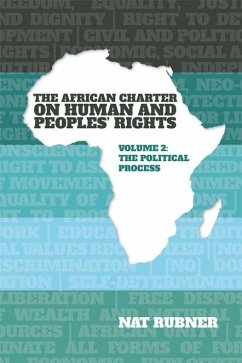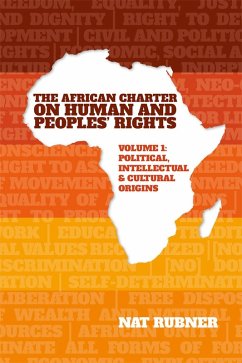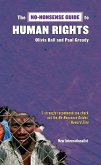Landmark study of the African Charter on Human and Peoples' Rights. Documents on one side the international community's inability to foist a human rights system upon Africa and on the other the process within the OAU (now African Union) that eventually brought it into being and determined its content.
The African Charter on Human and Peoples' Rights (ACHPR), which was proposed in 1979, adopted in 1981 and came into effect in 1986, was the first non-Western declaration of human rights and the first official statement of an African human rights perspective. With Africa largely absent in 1948 when the Universal Declaration of Human Rights (UDHR) was adopted, it stands in stark historical reproach to the Western conception of universal human rights as a pivotal document in the decolonisation of the continent. This book, for the first time, presents a comprehensive account of the development of the ACHPR, which is key to a proper understanding of its fundamental nature. Through documenting its process of construction, it becomes possible to understand how Africans themselves understood the process and the issues involved and how the ACHPR became a political text asserted by African leaders and not a continuum of a so-called universal human rights tradition. The result is a radical repositioning of the underlying context of the ACHPR, one of the most important documents in modern African history, of how it came to be and how it should therefore be understood.
Volume 2 describes the process through which the ACHPR came into being. Analysing the role of Western governments, the UN and NGOs, it shows that, contrary to the prevailing view of African human rights commentators, their influence was limited and at times counter-productive. That, in fact, the formulation of the ACHPR was a profoundly political process that was primarily a product of an African desire to instigate its own human rights perspective as a counter to the human rights universalism advanced by the Western post-war human rights tradition.
The African Charter on Human and Peoples' Rights (ACHPR), which was proposed in 1979, adopted in 1981 and came into effect in 1986, was the first non-Western declaration of human rights and the first official statement of an African human rights perspective. With Africa largely absent in 1948 when the Universal Declaration of Human Rights (UDHR) was adopted, it stands in stark historical reproach to the Western conception of universal human rights as a pivotal document in the decolonisation of the continent. This book, for the first time, presents a comprehensive account of the development of the ACHPR, which is key to a proper understanding of its fundamental nature. Through documenting its process of construction, it becomes possible to understand how Africans themselves understood the process and the issues involved and how the ACHPR became a political text asserted by African leaders and not a continuum of a so-called universal human rights tradition. The result is a radical repositioning of the underlying context of the ACHPR, one of the most important documents in modern African history, of how it came to be and how it should therefore be understood.
Volume 2 describes the process through which the ACHPR came into being. Analysing the role of Western governments, the UN and NGOs, it shows that, contrary to the prevailing view of African human rights commentators, their influence was limited and at times counter-productive. That, in fact, the formulation of the ACHPR was a profoundly political process that was primarily a product of an African desire to instigate its own human rights perspective as a counter to the human rights universalism advanced by the Western post-war human rights tradition.
Dieser Download kann aus rechtlichen Gründen nur mit Rechnungsadresse in A, D ausgeliefert werden.




![The African Charter on Human and Peoples' Rights [2 volume set] (eBook, PDF) The African Charter on Human and Peoples' Rights [2 volume set] (eBook, PDF)](https://bilder.buecher.de/produkte/68/68975/68975541m.jpg)




